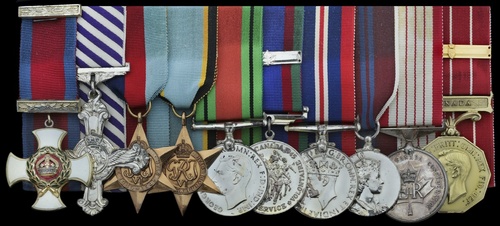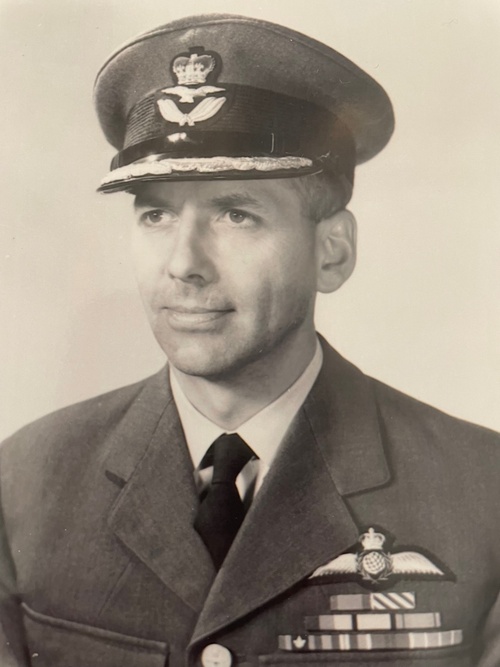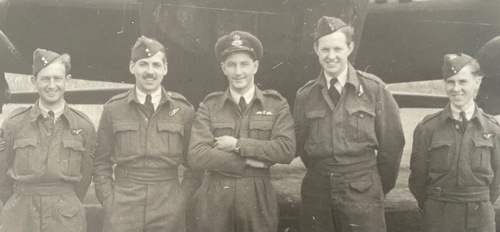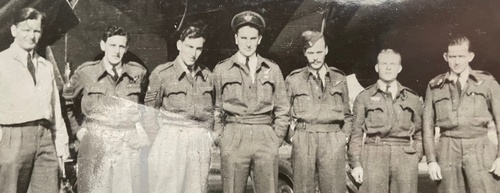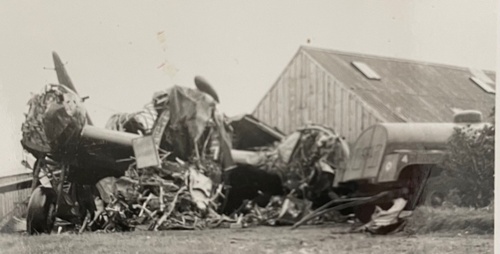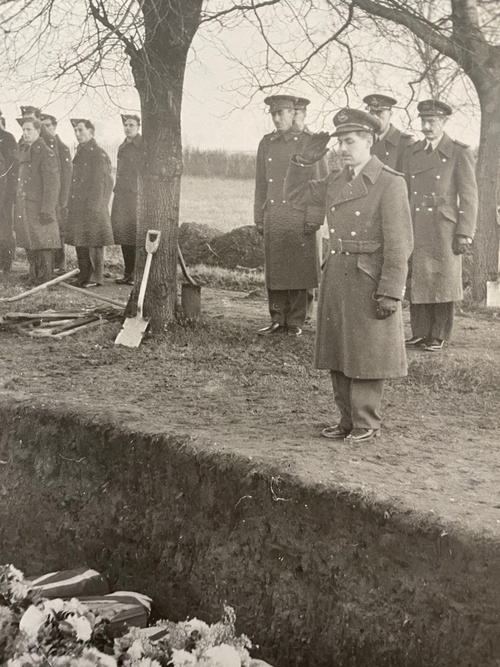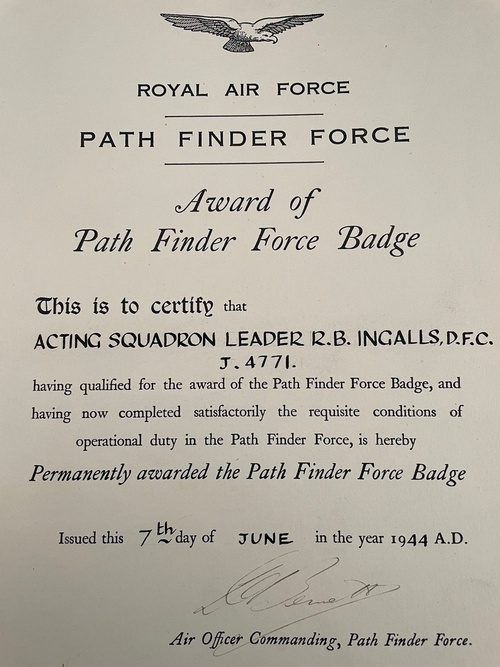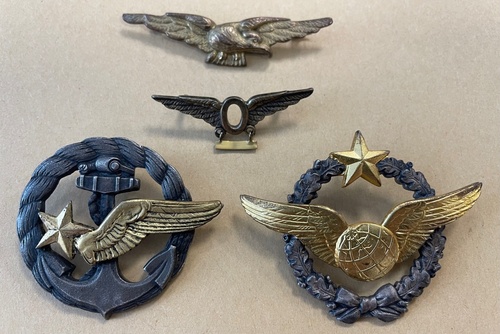Auction: 22003 - Orders, Decorations and Medals
Lot: 478
(x) An outstanding Pathfinder Force 1944 D.S.O., 1942 D.F.C. group of ten awarded to Group Captain R. B. Ingalls, Royal Canadian Air Force
Ingalls was a gallant airman of the highest calibre, lucky to escape an air crash which cost the lives of three of his comrades, he flew on no less than 52 Ops over the most heavily defended targets of Europe and shared in no less than eight visits to 'The Big City' - Berlin - besides flying two Ops during 'Big Week', he concluded his career in the crew of the Master Bomber
Distinguished Service Order, G.VI.R., reverse officially dated '1944', top riband bar adapted for mounting and loop a little bent; Distinguished Flying Cross, G.VI.R., reverse officially dated '1942'; 1939-45 Star; Air Crew Europe Star; Defence Medal 1939-45; Canadian Service Medal 1939-45, with Overseas Service clasp; War Medal 1939-45; Coronation 1953; Canada Confederation Centennial 1867-1967; Canadian Forces Decoration, G.VI.R., with Additional Service Bar (W/C R. B. Ingalls.), traces of lacquer, very fine (10)
D.S.O. London Gazette 14 July 1944:
'Since being awarded the Distinguished Flying Cross this officer has completed very many sorties, involving attacks on a wide range of important and well defended targets. His navigational ability has been of a high order throughout and he has played a good part in the successes obtained. He has at all times displayed a high degree of courage and determination and his example has impressed all.'
The original Recommendation states:
'This officer has taken part in 52 attacks on mostly heavily defended German targets. His aircraft has on many occasions been the target for enemy defences which have frequently rendered his navigational aids unserviceable. The successful completion of many operational flights was due to his resourcefulness, initiative and skilful navigation. He is an outstanding example of accuracy and cheerfulness when the odds are against him. Squadron Leader Ingalls has an unconquerable spirit of determination to achieve his objective, and a fine offensive spirit. He is a navigator of a very successful marking crew. He is recommended for the award of the Distinguished Service Order.'
The above statement was supported by the Officer Commanding, Station Little Rissington (20 May 1944) and by the Air Officer Commanding, No.8 Group (30 May 1944) before approval by Air Chief Marshal Sir Arthur Harris, Air Officer Commanding-in-Chief, Bomber Command, on 22 June 1944.
D.F.C. London Gazette 11 August 1942:
'As air observer Flying Officer Ingalls has participated in numerous operational sorties over enemy occupied territory. His coolness in the face of the heaviest defences has contributed materially to the successes obtained. Whatever the circumstances, he shows the greatest determination to locate and bomb his objective. He always endeavours to impart his knowledge to those of less experience.'
AIR 2/9595 has an earlier draft of the above citation, at which point he had completed 25 Ops (141 operational hours):
'As air observer Flying Officer Ingalls has participated in numerous operational sorties over enemy and enemy occupied territory. His coolness in the face of the heaviest defences has contributed materially to the successes obtained. Unperturbed whatever the circumstances, he shows the greatest determination to locate and bomb his objective. He always endeavours to impart his knowledge to those with less experience.'
Ross Baxter Ingalls was born at Danville, Quebec on 23 July 1914 and was educated at Brantford and Bishop's University. Upon the outbreak of the Second World War he enlisted at Quebec on 19 July 1940 and was posted to Trenton in August and thence to No. 2 I.T.S. at the end of that month. Having completed basic training Ingalls graduated and was promoted Leading Aircraftman on 12 October 1940. He then went onto No. 3 A.O.S. from 14 October 1940-6 January 1941, when posted to No. 2 B.G.S., being promoted Sergeant and posted to No. 1 A.N.S., whence he graduated and was commissioned on 15 March 1941.
Proceeding to the Embarkation Depot in March 1941, he proceeded overseas on 21 May 1941 in the crew of Liberator AM922, arriving in Britain 22 May 1941. On 5 August 1941 he was flying in Wellington N2828, Piloted by Pilot Officer Griffin of No. 20 OTU. Having been engaged in air-to-air firing, it returned to base in high winds and rain, which seriously reduced visibility. Heading for some trees when coming into land, the Pilot took avoiding action, stalled and crashed. Three of the crew were killed and three (including Ingalls) were injured.
First Tour - D.F.C.
Ingalls joined 'B' Flight, No. 142 Squadron in October 1941 and flew his first Op on Boulogne on 12 October, bombing the docks. His tour would last through to November 1942, in which time his record reads as follows:
21 October 1941 - Bremen
31 October 1941 - Hamburg
7 November 1941 - Mannheim
8 November 1941 - Ruhr '...caught search-lights - two hits heavy flak - no damage.'
30 November 1941 - Sylt '...conditions ideal'
6 January 1942 - Brest '...intense & accurate heavy flak - hit several times - approx. 30 holes incl. star. petrol tank.'
8 January 1942 - Brest '...mod. heavy flak - holed twice inc. port petrol tank.'
17 January 1942 - Bremen
20 January 1942 - Emden
27 February 1942 - Kiel
3 March 1942 - Paris, Renault Works
8 March 1942 - Essen '...successful evasive glide.'
5 April 1942 - Cologne '...picked up by Me109 - successfully evaded - bombs dropped Bonn area.'
8 April 1942 - Hamburg
10 April 1942 - Essen
12 April 1942 - Essen
14 April 1942 - Dortmund 'Vis. good + flares - caught in cone S.L.s & flak - Ht. 12000' glide attack target area - bombs released and dove out @ 2000'.'
24 April 1942 - Rostock
26 April 1942 - Rostock '...increased flak - windscreen holed.;
27 April 1942 - Cologne
19 May 1942 - Mannheim
29 May 1942 - Paris
30 May 1942 - Cologne
1 June 1942 - Essen
13 July 1942 - Duisburg '...Flares useful - bombed built up area on E. bank Rhine @ 9000'.'.
Having completed this action-packed Tour, Ingalls was rewarded with the Distinguished Flying Cross.
Second Tour - D.S.O.
Posted via No. 405 to No. 97 Squadron at Bourm in September 1943, he was soon back into the thick of the action, now working with the Pathfinder Force. His Ops with No. 97 Squadron were as follows:
22 September 1943 - Hanover
23 September 1943 - Mannheim
27 September 1943 - Hanover
2 October 1943 - Munchen
4 October 1943 - Frankfurt
18 October 1943 - Hanover
20 October 1943 - Leipzig '...port outer hit H.F. over target'
22 October 1943 - Kassel
2 December 1943 - Essen
3 December 1943 - Leipzig
16 December 1943 - Berlin
20 December 1943 - Frankfurt
29 December 1943 - Berlin
20 January 1944 - Berlin
28 January 1944 - Berlin
30 January 1944 - Berlin
15 February 1944 - Berlin
19 February 1944 - Leipzig
20 February 1944 - Stuttgart
15 March 1944 - Stuttgart
18 March 1944 - Frankfurt
24 March 1944 - Berlin.
His Ops of late 1943 and the first months are particularly striking and worthy of further mention, for Ingalls shared in no less than seven visits to attack Berlin - 'The Big City' - in the space of little more than eight weeks, only attacking Leipzig and Frankfurt after the first visit, then it was six straight Ops over the most heavily defended target in Europe.
Furthermore, Ingalls then went onto share in famous raids of 'Big Week', 20-25 February 1944, as part of the European strategic bombing campaign in collaboration with our American cousins. On 19 February, flying in Lancaster NO415 'Z' and with Wing Commander Carter at the controls, they were part of a force of 823 aircraft of the Royal Air Force that rounded upon Leipzig. The next night and this time aboard Lancaster JB300 'D' and with Wing Commander Dunnicliffe at the controls, they were part of a force of 598 aircraft of the Royal Air Force that made Stuttgart their target - to great effect.
Transferred to No. 582 Squadron in April 1944, he completed his War with the following Ops:
18 April 1944 - Noisy-le-Sec (Illuminator)
24 April 1944 - Karlsruhe (B.M.I.)
27 April 1944 - Aulnoye (Master Bomber) 7 May 1944 - Nantes (Illuminator).
Tour expired, Ingalls returned to Canada on 7 July 1944 and his richly-deserved D.S.O. followed soonafter. He was sent up to War Staff College on 9 September 1944, was promoted Wing Commander on 1 October 1945 and went onto the Canadian Air Force HQ in November 1944.
Post-War, Ingalls reverted to Squadron Leader but was again advanced Wing Commander, 1 June 1947 and posted to Royal Roads, 1947. He came over to London in 1949 and then returned to join the Staff of the Royal Canadian Air Force Staff College in 1951. Made Commanding Officer of the Station at Winnipeg in January 1953 as Group Captain, he was made Director of Air Intelligence in August 1955. Ingalls had also earned his French Naval Air Arm Navigators Badge, one of just three Canadians to do so. He attended the National Defence College, Kingston in 1959 and went out to Sweden as Air Attache, December 1960. He was latterly at Northern NORAD Headquarters, North Bay. The Group Captain died in Ottawa on 29 October 2006.
Sold together with the following archive of original material:
(i)
Royal Canadian Air Force Observer's and Air Gunner's Flying Log Book, spine a little distressed.
(ii)
Path Finder Force Badge and award Certificate, dated 7 June 1944.
(iii)
Royal Canadian Air Force Observer's Badge Certificate, dated 9 August 1944 and Royal Canadian Air Force Bar to Observer's Badge Certificate, dated 10 August 1944 - together with his original Badge & Bar .
(iv)
Air Navigator's 2nd Class Certificate, dated 1 July 1942.
(v)
Letters of congratulation on award of the D.F.C. from the High Commissioner for Canada and the Air Officer in Chief of the R.C.A.F. Overseas.
(vi)
His two French qualification Badges, both with maker's details to reverse, the French Naval Air Arm Navigators Badge numbered '2086A'.
(vii)
A number of photographs, metal Badges and cloth insignia.
Subject to 5% tax on Hammer Price in addition to 20% VAT on Buyer’s Premium.
Sold for
£7,000
Starting price
£4200

